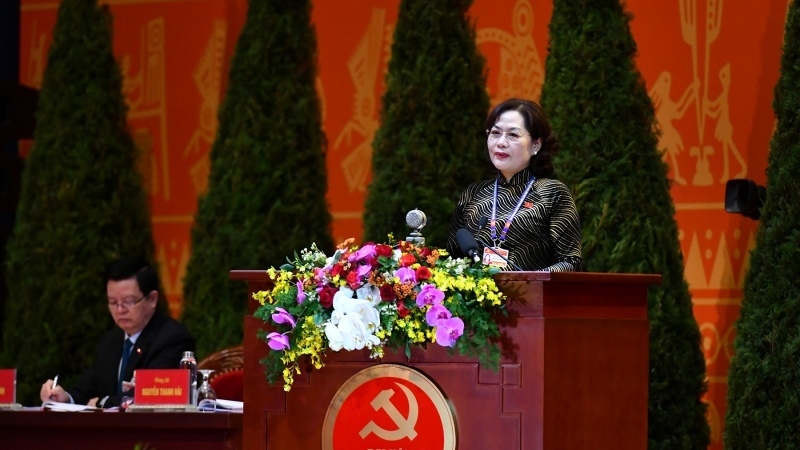Central banker outlines key tasks for next five years in Congress speech
ABO/NDO - Governor of the State Bank of Vietnam (SBV) Nguyen Thi Hong has set out the major tasks to be carried out by the central bank over the next five years in her speech as delivered to the 13th National Party Congress on January 27.
She said that the global situation will continue to be complicated and unpredictable in general as well as the fact that the Covid-19 pandemic is expected to continue for several years, affecting the socio-economic development of most countries and territories around the world.
As Vietnam is a deeply integrated and highly open economy, domestic business activities will continue to struggle, something which is bound to affect the banking system’s operation, especially the restructuring and handling of bad debt.
 |
| State Bank of Vietnam Governor Nguyen Thi Hong delivers her speech at the 13th National Party Congress. |
According to Governor Hong, the central bank will persist with the goal of keeping inflation in check and maintaining macroeconomic stability. It will also coordinate monetary policy with other policies in order to increase Vietnam’s economic resilience against global economic and monetary vulnerability.
The central bank will seek to increase Vietnam’s foreign reserves, when appropriate, as a buffer against external shock, helping increase the Vietnamese economy’s independence alongside its process of international economic integration.
Over the next five years, the SBV will continue implementing measures to remove difficulties facing enterprises and the people, supporting economic recovery in the post-Covid period, promoting sustainable growth, expanding credit to priority sectors and restricting credit to risky sectors.
In her speech, Hong also underlined measures to protect national monetary security, deal with bad debt effectively, boost the use of non-cash payment methods and promote financial inclusion.
According to the central banker, the banking system has recorded significant achievements in the past five years, including its success in keeping inflation below 4% as set out by the National Assembly, helping ensure macroeconomic stability, supporting economic growth and stabilising the money and foreign exchange markets.
The SBV also managed to provide sufficient capital for the economy in alignment with inflation targets, with credit growth averaging 15% per year, except for 2020 when it fell to 12.13% due to the impact of Covid-19.
The effective restructuring of credit institutions and handling of bad debt were also bright spots in the central bank administration during the 2016-2020 period.
(Source: NDO)
 về đầu trang
về đầu trang







